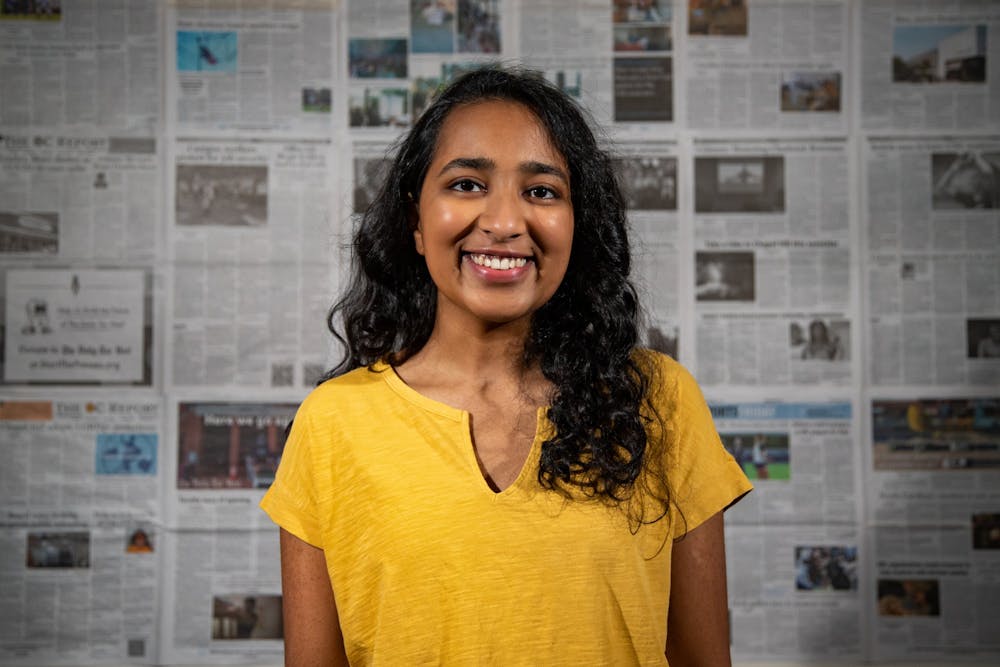Working on the University desk was her first exposure to intense journalism, and she covered high-profile stories like Maya Little’s honor court case and former Chancellor Carol Folt’s resignation.
Since then, she’s worked as a senior writer for the University and City desks, produced the weekly podcast “Heel Talk” and been an online assistant editor. Now, she leads newsletters and social media as audience engagement editor.
In between audience engagement editor duties, she finds time to help out with breaking news and write front-page stories. She also works for the DTH’s 1893 Brand Studio, which she said has given her a fresh, crucial view of how the newsroom runs and ways to keep it afloat.
“I’ve worn a lot of hats now, which I really like because I feel like I've gotten to know the paper really well that way,” she said.
Cheryl Hatch was Somasundaram’s advisor when, in high school, she worked as features editor of The Guilfordian through the Early College at Guilford program. Hatch also mentored Somasundaram when she became the youngest person to ever receive the Pulitzer Center’s Campus Consortium fellowship.
Hatch spoke to Somasundaram’s leadership skills, which she said were evident even when Somasundaram was high school-aged.
“She's so persistent and tenacious,” Hatch said. “But again, totally sweet, empathetic and gently quiet, you know, she's there. And she gets it done.”
An emphasis on diversity and community engagement
Somasundaram would be the second Asian American editor the DTH has selected since 1993. Of the 30 editors-in-chief during this time period, there have been fewer than five who identified as people of color.
She doesn’t take this lightly.
“For me, if I were to have seen a woman of color as my editor-in-chief, it would have made the world of a difference,” she said.
A large part of Somasundaram’s platform is diversity, equity and inclusion.
To get the day's news and headlines in your inbox each morning, sign up for our email newsletters.
“Being a staffer and editor of color has given me a keen perspective on both the improvements we've made in DEI this year but also what we need to continue improving, so that is the first thing in my platform,” she said.
She was part of the first cohort of the Sharif-Durhams leadership program, a talent and leadership development course for DTH students from underrepresented groups.
As part of the cohort, she helped conceptualize Elevate, a print and online spread that amplifies the voices of underrepresented communities.
Next year, Somasundaram wants to expand on the DTH’s current DEI work. Her platform includes creating a DEI committee with representatives from each desk, being intentional about recruitment efforts to diversity staff and creating a consistent curriculum to train staffers and editors.
“The idea is to turn the activities that we have into outcomes,” she said.
Another part of Somasundaram’s platform is community engagement. She wants to increase the paper’s accessibility by adding transparency boxes to stories, holding community events and incorporating focus group work into the workflow. She also wants to create video and audio editor positions to be part of a central multimedia hub for the paper.
Her platform also includes newsroom sustainability, staff training and culture and recruitment.
Somasundaram said reporting for the DTH through the pandemic and seeing how much the community relies on the paper as a resource is what pushed her to apply for editor-in-chief.
“Especially because I work for so many different areas of the paper, as much as it has given me unforgettable experiences and how I found a home, I also see a lot of areas that we can improve in,” she said.
@sonjarao
CORRECTION: A previous version of this article incorrectly spelled former UNC student Maya Little's name. The article has been updated to include the correct spelling. The Daily Tar Heel apologizes for this error.



